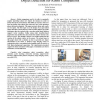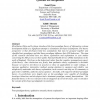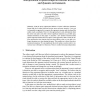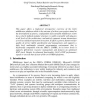46 search results - page 7 / 10 » Developing high-level cognitive functions for service robots |
IROS
2006
IEEE
14 years 1 months ago
2006
IEEE
- Robot companions need to be able to constantly acquire knowledge about new objects for instance in order to detect them in the environment. This ability is necessary since it is ...
ECIS
2003
13 years 8 months ago
2003
Hirschheim, Klein and Lyytinen introduced the four-paradigm theory of information systems development (ISD) as a significant attempt to systematise developer assumptions. The theo...
ROBOCUP
2001
Springer
13 years 12 months ago
2001
Springer
With the more sophisticated abilities of teams within the simulation league high level online functions become more and more attractive. Last year we proposed an approach to recogn...
MMS
2002
13 years 7 months ago
2002
This paper offers a high-level retrospective overview of the GOPI middleware platform which is the outcome of a three year project aimed at the development of generic, configurabl...
AR
2006
13 years 7 months ago
2006
The development and expression of many higher level cognitive functions, such as imitation, spatial perception, and tool-use relies on a multi-modal representation of the body kno...




